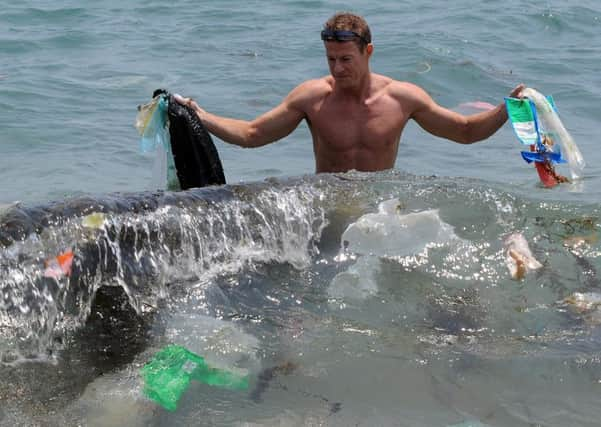Packaging entrepreneur vows to '˜change the history of plastic use'


Daphna Nissenbaum, an Israeli software engineer and businesswoman, came up with the idea of fully-compostable flexible packaging after an argument with one of her children about throwing away plastic bottles.
Now her company TIPA is supplying packaging for Dutch supermarket chain Ekoplaza, which recently unveiled the first shopping aisle stocking goods that are free of plastic.
Advertisement
Hide AdAdvertisement
Hide AdThe problem of single-use plastic, much of which ends up in the countryside or in the oceans, where it kills and harms wildlife, has risen up the agenda in the UK recently.
It was one Ms Nissenbaum started thinking about after the argument with her child eight years ago.
She said: “I went jogging and thought there must be a different way to handle this packaging we argue about all day.
“I thought, what was the most natural way I handle waste? It’s when I eat an apple and throw away the residual part, I don’t feel bad about damaging the planet.”
She decided she wanted to develop flexible packaging that could be dealt with in the same way as orange or apple peel.
She co-founded and is chief executive of TIPA, which makes bioplastic packaging, with a proportion coming from plant materials.
It is designed to be fully compostable over a period of months in systems which collect other organic waste such as food, and many products can be composted at home, Ms Nissenbaum said.
“TIPA focuses on the end of life of packaging, what happens to the packaging when you stop using it.
Advertisement
Hide AdAdvertisement
Hide Ad“If it’s plastic it will stay here for hundreds and hundreds of years.”
But her company’s products decompose down into soil, she said.
“Our mission is to change the plastics history, we want the consumer to treat flexible packaging as organic material, not as plastic. I see TIPA as a solution provider to change the history of plastic.
“We are not going to be a niche market player, we’re going to be a mass market player.”
Product lines range from bags for fresh vegetables to pouches for grains and pasta, snack wrappers and coffee packets, with the focus on flexible packaging that replaces plastic that could not be recycled.
In the UK, snack brand Snact is using TIPA wrappings, while fashion designer Stella McCartney announced last year a commitment to using the alternative to plastic packaging.